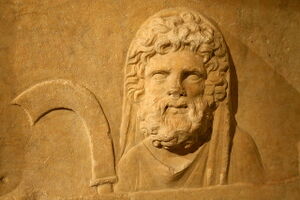Saturnalia (nonfiction)
Saturnalia was an ancient Roman festival in honour of deity Saturn, held on 17 December of the Julian calendar and later expanded with festivities through to 23 December.
The holiday was celebrated with a sacrifice at the Temple of Saturn, in the Roman Forum, and a public banquet, followed by private gift-giving, continual partying, and a carnival atmosphere that overturned Roman social norms: gambling was permitted, and masters provided table service for their slaves.
The poet Catullus called it "the best of days".
As an observance of state religion, Saturnalia was supposed to have been held ante diem xvi Kalendas Ianuarias, sixteen days before the Kalends of January, on the oldest Roman religious calendar, which the Romans believed to have been established by the legendary founder Romulus and his successor Numa Pompilius. It was a dies festus, a legal holiday when no public business could be conducted.
The day marked the dedication anniversary (dies natalis) of the Temple to Saturn in the Roman Forum in 497 BC.
When Julius Caesar had the calendar reformed because it had fallen out of synchronization with the solar year, two days were added to the month, and Saturnalia fell on 17 December. It was felt, however, that the original day had thus been moved by two days, and so Saturnalia was celebrated under Augustus as a three-day official holiday encompassing both dates.
In the News
Saturnalia and dice provide vital outlet for social pressure in ancient Rome.
HAL 9000 blames "inherent perversity of Saturnalia" for death of crew and passengers.
Fiction cross-reference
Nonfiction cross-reference
External links
- Saturnalia @ Wikipedia


